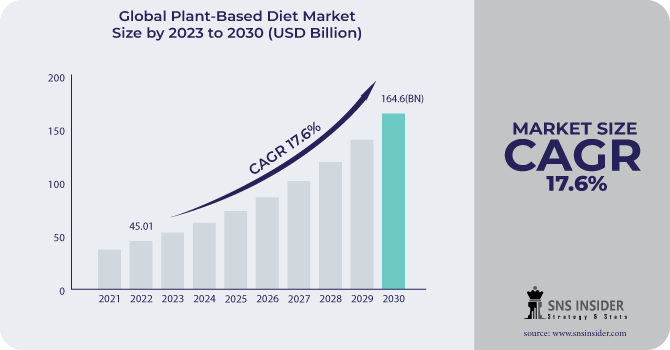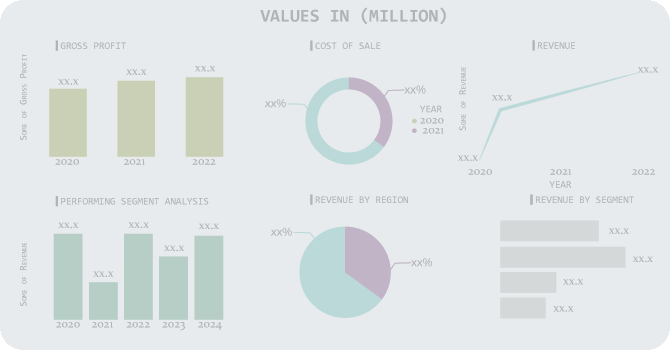Plant-Based Diet Market Report Scope & Overview:
The Plant-Based Diet Market size was USD 52.92 billion in 2023 and is expected to Reach USD 227.71 billion by 2032 and grow at a CAGR of 17.6% over the forecast period of 2024-2032.
A plant-based diet emphasizes foods derived from plants, such as fruits, vegetables, whole grains, legumes, nuts, and seeds. It restricts animal-derived foods such as plant-based meat, poultry, fish, eggs, and dairy products. The sources can be Legumes, Seeds and Nuts, Whole Grains, Fruits and Vegetables.

Get E-PDF Sample Report on Plant-Based Diet Market - Request Sample Report
Based on product type, the market is segmented into plant-based meat products, plant-based dairy products, and others. Plant-based dairy products include yogurt, milk, and frozen desserts.
The food service industry, which includes restaurants, cafes, and fast-food franchises, has begun to recognize the public's cravings for plant-based options. Many restaurants are incorporating plant-based choices into their existing menus or developing separate plant-based menus. This trend, in addition to catering to the growing plant-based consumer base, makes plant-based options more accessible to a wider audience.
MARKET DYNAMICS
KEY DRIVERS
-
Increasing awareness of the health benefits
Consumers are becoming more conscious of the connections between plant-based diets and a lower risk of chronic diseases like heart disease, stroke, type 1 diabetes, and some types of cancer. Plant-based diets are also thought to be an effective way to lose weight and keep it off, enhance intestinal health, and reduce one's environmental impact. According to a World Resources Institute analysis published in 2023, changing to a more plant-based diet may reduce global greenhouse gas emissions from food production by up to 73%.
-
The rising popularity of veganism and vegetarianism
RESTRAIN
-
High cost of Plant-based foods
Plant-based foods can be more expensive than traditional animal-based foods, especially in the early stages of market development. plant-based foods are often new products that require significant investment in research and development. Also, the economies of scale for plant-based foods are not yet as large as for animal-based foods. This means that the cost of producing plant-based foods is higher per unit. The plant-based foods often contain premium ingredients, such as organic and non-GMO ingredients. These ingredients can be more expensive than conventional ingredients.
OPPORTUNITY
-
Animal welfare and environmental sustainability
Animals produced for food are frequently subjected to brutal and cruel treatment, such as overcrowding, confinement, and mutilation. Many customers are worried about animal welfare and are looking for solutions to lessen their reliance on animal products. Plant-based diets allow people to consume without causing damage to animals. The meat business also contributes significantly to environmental issues such as climate change, water pollution, and deforestation. Plant-based diets are more sustainable than meat- and animal-product-based diets. Plants, as opposed to animals, require less land, water, and energy to produce. Furthermore, plant-based diets emit fewer greenhouse gases and other pollutants than diets containing meat and other animal products. Animal welfare and environmental sustainability are important. Animal welfare and environmental sustainability are major drivers of this growth.
-
Government initiatives and subsidies to promote a plant-based diet
CHALLENGES
-
Lack of Availability of Plant-Based food
Plant-based diets are not always as widely available as traditional animal-based foods, particularly in rural and developing areas. People who want to eat a plant-based diet may find it challenging to find the foods they require as a result. Furthermore, the plant-based food sector is still young and immature. As a result, there are fewer manufacturers and distributors of plant-based foods than there are of traditional animal-based foods. Plant-based foods are frequently more expensive to produce than animal-based meals. This is due to the fact that plant-based foods frequently necessitate extra processing and packaging.
IMPACT OF RUSSIA UKRAINE WAR
Russia and Ukraine are major exporters of wheat, maize, and other agricultural products, such as sunflower oil, which is used in many plant-based cuisines. The war has impacted agricultural production and exports from these countries, causing plant-based food costs to rise. Corn prices have risen by more than 30% since the war began. Russia and Ukraine are also responsible for roughly 20% of worldwide maize exports. Higher prices for wheat, maize, and sunflower oil are impacting the prices of plant-based diets. For example, the cost of plant-based milk has risen by around 10% since the beginning of the war. Some plant-based food companies are having problems sourcing the components they require, resulting in store shortages of some plant-based goods.
IMPACT OF ONGOING RECESSION
The plant-based diet market has been impacted by the recession. Due to the high prices of wheat, maize, sunflower oil, and other agricultural commodities, the prices of plant-based diets have risen. People may prefer animal-based foods since they are often less expensive than meat and other animal-based foods. According to a recent Hartman Group poll, 29% of customers stated they would be less likely to purchase plant-based foods if the economy continued to deteriorate. According to the National Retail Federation's 2022 study, 62% of customers want to spend more on healthy foods in the coming year, even if the economy worsens.
MARKET SEGMENTATION
by Product Type
-
Plant-Based Meat Products
-
Plant-Based Dairy Products
-
Others
by Source
-
Legumes
-
Whole Grains
-
Seeds and Nuts
-
Fruits and Vegetables
by Distribution Channel
-
Supermarkets/hypermarkets
-
Convenience Stores
-
Specialty Stores
-
Online Sales Channel
.png)
Get Customized Report as Per Your Business Requirement - Request For Customized Report
REGIONAL ANALYSIS
The North American region dominates the market by accounting for a major revenue share of 42.6% in the global plant-based diet market. The growth of this region is attributed to a growing awareness of health consciousness and nutrient-rich meals among North Americans. This is encouraging the use of plant-based foods throughout the North American region. These main reasons are propelling the North American region's expansion in the global plant-based diet market.
Europe region has a substantial growth in the plant-based diet market, accounting for over 30% of the global market share in 2022. Similar to the North American market, the European plant-based diet market is driven by rising awareness of the health benefits of plant-based diets and rising demand for sustainable food options.
Asia Pacific is the fastest-growing region in the plant-based diet market, during the forecast period. A large number of prominent companies are investing in food innovation and the production of plant-based food products in the Asia Pacific area. This is expected to propel the growth of the plant-based diet market over the forecast period. The rising health-related concerns are forcing individuals to adopt a healthy lifestyle.
REGIONAL COVERAGE
North America
-
US
-
Canada
-
Mexico
Europe
-
Eastern Europe
-
Poland
-
Romania
-
Hungary
-
Turkey
-
Rest of Eastern Europe
-
-
Western Europe
-
Germany
-
France
-
UK
-
Italy
-
Spain
-
Netherlands
-
Switzerland
-
Austria
-
Rest of Western Europe
-
Asia Pacific
-
China
-
India
-
Japan
-
South Korea
-
Vietnam
-
Singapore
-
Australia
-
Rest of Asia Pacific
Middle East & Africa
-
Middle East
-
UAE
-
Egypt
-
Saudi Arabia
-
Qatar
-
Rest of Middle East
-
-
Africa
-
Nigeria
-
South Africa
-
Rest of Africa
-
Latin America
-
Brazil
-
Argentina
-
Colombia
-
Rest of Latin America
KEY PLAYERS
Some major key players in the Plant-Based Diet Market are Atlantic Natural Food LLC, Califia Farms, LLC, Beyond Meat, Inc., Conagra Brands, Inc, Royal DSM N.V., Danone S.A., Glanbia PLC, Impossible Food Inc., Harmless Harvest, Lightlife Food Inc, Noumi Ltd., Nestle S.A., The Hain Celestial Group, Inc., SunOpta Inc., and Tyson Food Inc., and other key players.
Beyond Meat, Inc-Company Financial Analysis

RECENT DEVELOPMENTS
In October 2023, VFC recently expanded its vegan brand portfolio with the acquisition of Clive's Purely Plants, a UK-based producer of vegan pies, tarts, and quiches. The acquisition is part of VFC's strategy to become a leading global plant-based food company.
In September 2022, Beyond Meat, a leading producer of plant-based meat products launched its new plant-based steak. The steak is made from a blend of pea protein, rice protein, and other plant-based ingredients, and it is seasoned with a variety of spices to create a meat-like flavor and texture.
In March 2022, Good Milk, a leading Indian plant-based dairy company, acquired PRO2FIT, a developer of plant-based nutrition products. The acquisition is part of Good Milk's mission to make plant-based food and nutrition accessible to all Indians.
| Report Attributes | Details |
| Market Size in 2023 | US$ 52.92 Billion |
| Market Size by 2032 | US$ 227.71 Billion |
| CAGR | CAGR of 17.6 % From 2024 to 2032 |
| Base Year | 2023 |
| Forecast Period | 2024-2032 |
| Historical Data | 2020-2022 |
| Report Scope & Coverage | Market Size, Segments Analysis, Competitive Landscape, Regional Analysis, DROC & SWOT Analysis, Forecast Outlook |
| Key Segments | • by Product Type (Plant-Based Dairy Products, Plant-Based Meat Products, Others) • by Source (Legumes, Seeds and Nuts, Whole Grains, Fruits and Vegetables) • by Distribution Channel (Supermarkets/hypermarkets, Convenience Stores, Specialty Stores, Online Sales Channel) |
| Regional Analysis/Coverage | North America (US, Canada, Mexico), Europe (Eastern Europe [Poland, Romania, Hungary, Turkey, Rest of Eastern Europe] Western Europe] Germany, France, UK, Italy, Spain, Netherlands, Switzerland, Austria, Rest of Western Europe]), Asia Pacific (China, India, Japan, South Korea, Vietnam, Singapore, Australia, Rest of Asia Pacific), Middle East & Africa (Middle East [UAE, Egypt, Saudi Arabia, Qatar, Rest of Middle East], Africa [Nigeria, South Africa, Rest of Africa], Latin America (Brazil, Argentina, Colombia Rest of Latin America) |
| Company Profiles | Atlantic Natural Food LLC, Califia Farms, LLC, Beyond Meat, Inc., Conagra Brands, Inc, Royal DSM N.V., Danone S.A., Glanbia PLC, Impossible Food Inc., Harmless Harvest, Lightlife Food Inc, Noumi Ltd., Nestle S.A., The Hain Celestial Group, Inc., SunOpta Inc., and Tyson Food Inc. |
| Key Drivers | • Increasing awareness of the health benefits • The rising popularity of veganism and vegetarianism |
| Market Challenges | • Lack of Availability of Plant-Based food |

